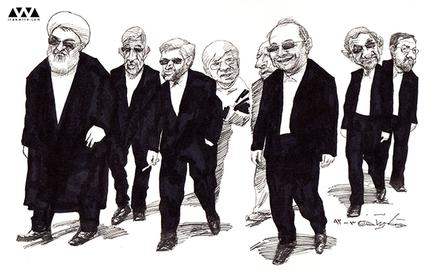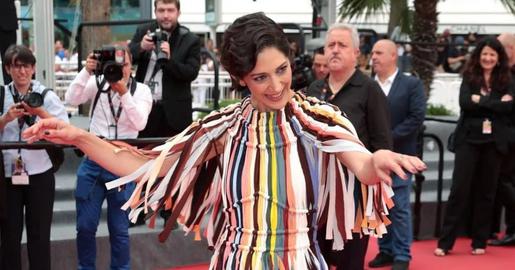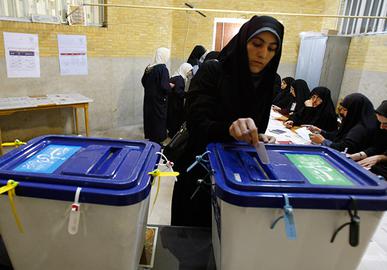By Alain Lempereur and Amir Hossein Mahdavi
This Friday's presidential election in Iran can be rightly be viewed as a referendum on the country's nuclear program. With Iran's economy collapsing under Western sanctions and the weight of government mismanagement, food prices are up by 70 percent and the exchange rate of Iran’s currency against the dollar has surged by 100 percent over the last 18 months. Every day brings bad news about higher prices and goods shortage, even for medical supply and drugs.
On Friday, most citizens will come to the polls with economic hardships in mind, and they know these problems will only be tackled if Western sanctions are eased. For this to happen, the international community must reach an agreement with Iran over its nuclear program. Iranians are savvy enough to know they face a hard choice among candidates, from the most moderate, Hassan Rowhani, to the most extreme, Saeed Jalili. The negotiation outcomes after the election will decide between hope for peaceful coexistence or risks of escalations and likely war. But Iran is complex, and appearances can be deceiving.
Two former chief Iranian negotiators are running for president. One, Hassan Rowhani, and his team are viewed as pragmatic diplomats, yet less appealing to Khamenei’s office. The state-controlled media and the fundamentalist groups have labeled him the West’s favorite negotiator. Rowhani’s potential chance for victory, although slim, might result in a government willing to reach an agreement. However, the very reason that makes him appealing to the West makes him vulnerable to attacks by the powerful extremists, should he become president and direct the talks again. Any negotiation deal might never be ratified. If Khamenei does not fully trust the president and the negotiating team, the negotiation direction can become highly complicated. Anyhow, if Rowhani or another moderate candidate is elected, the West should show self-restraint, and avoid expressing positive excitement, as such signal would be a poisoned gift. Any obvious message of Western support might nurture Khamenei’s mistrust.
The second candidate, Saeed Jalili, comes from the opposite side of the political spectrum. Though his expertise as diplomat and that of his political appointees were limited, his six-year term as negotiator has taught him the limitations and risks associated with a hardline approach. His underachieving leadership has increased both sanctions and the risks of a full-fledged conflict. However his undeniable asset remains his close relationship with Khamenei. Jalili’s policy becomes crystal clear in the concluding remarks of his dissertation: “The Prophet’s threats indicated that although his main strategy was establishing peace, threatening with war was used as a valuable tactic too.” Jalili’s interpretation is dangerous, as even when he is inclined towards peace he is seriously considering war as an effective means to force the enemy to surrender. Such prospective policy might be suicidal not only for himself but for an entire nation and the region.
A few weeks ago, Khamenei stated that “wearing an iron armor and having stamina and perseverance against the enemy” are the traits of the best president. Khamenei could not endorse more Jalili’s qualifications and ideology. If Jalili wins the election, it might not be good news for the people of good will, whatever their side. At minimum it means achieving peace in the short term might look so arduous that the West may pursue their political interests through other means.
However, an alignment of those who share the same extreme views, and control the Supreme Leader’s office, the executive branch, and the nuclear negotiation affairs, does not necessarily make peace impossible. Hardliners, when they assume executive positions, sometimes become realistic, toning down their rhetoric. Jalili’s rise to power might make him more accountable and pragmatic, recognizing the terrible effects of economic sanctions and failed nuclear talks. He might want to prioritize the people’s wellbeing and leave a positive legacy in Iran’s history. Therefore, even the election of this tough negotiator may paradoxically contribute to peace, provided the West also gives him a last chance, with a clear deadline to circumvent stalling.
Just as the West’s excessive support of Iran’s moderate candidates may weaken their leverage, taking a stance against extremist parties may increase Iranian isolation and push its rulers to the most dangerous confrontation. The door for Iran returning to the international community should be left open for a while, whoever wins the elections, so that even the most extremists see a chance for an honorable peace. The West is faced with a predicament in crafting responsible reactions to Iran’s election. They need two plans for the two likely results: a savvy diplomat with lower authority, and hardly a diplomat with full authority.
Alain Lempereur is Alan B. Slifka professor of Coexistence and Conflict at Brandeis University and a member of the Executive Committee of Program on Negotiation at Harvard Law School
Amir Hossein Mahdavi is a former Iranian journalist and Research Assistant at Brandeis University.




















comments